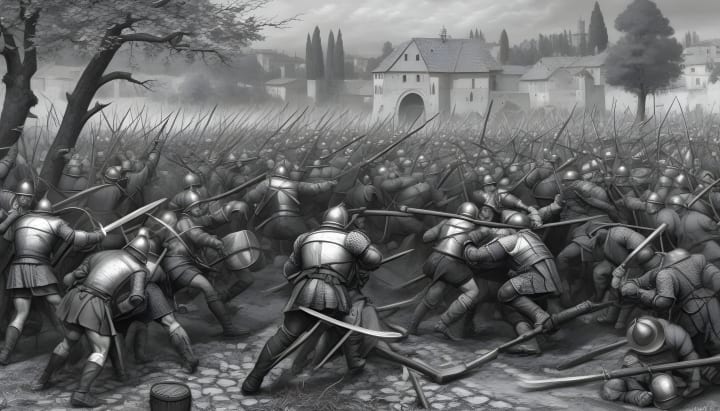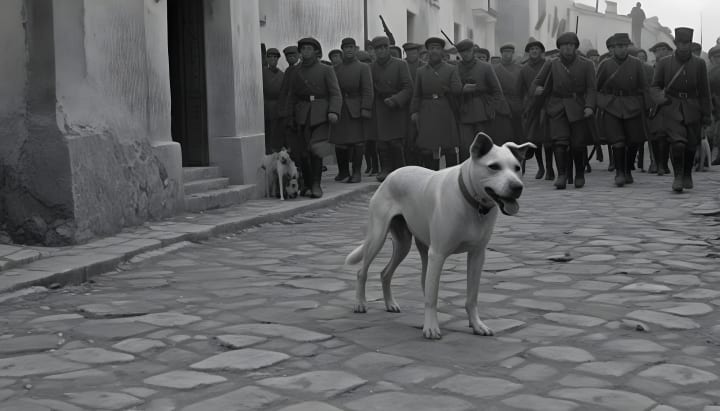The 5 Most Ridiculous Wars in History That Defied Logic and Reason
Top 5 Most Ridiculous Wars in History, Where Trivial Incidents Ignited Unbelievable Conflicts, Testing the Limits of Logic and Reason. From Stolen Buckets to Stray Dogs, Explore the Peculiar Episodes That Transformed Minor Quibbles Into Major Wars, Offering Insights into the Unpredictable Nature of Human Conflict.

Throughout history, humanity has witnessed countless conflicts driven by territorial disputes, political ideologies, and religious beliefs. However, some wars stand out not for their grandeur or significance, but for their utterly ridiculous and avoidable origins. In this article, we delve into the top five most absurd wars fought across different centuries and regions, exploring the bizarre circumstances that led to bloodshed, loss of lives, and international crises.
1. The Flagstaff War (1840-1846) - British Forces vs. Hone Heke's Tribe in New Zealand

The Flagstaff War, a pivotal event in New Zealand's colonial history, epitomizes the intricate interplay of cultural clashes and imperial aspirations. Unfolding in 1840 against the backdrop of the British Empire's expansionist zeal, British forces aimed to assert their dominance by hoisting the Union Flag over Kororareka, a town infamous for its seedy establishments.
This seemingly routine act sparked a clash between two worlds. The British, underestimating local sentiments, viewed it as a symbol of dominance, while Hone Heke, a proud tribal chief, considered it an affront to his people's autonomy and a blatant display of British imperialism. Hone Heke's initial act of cutting down the flagpole set off a six-year conflict.
In a more diplomatic era, negotiation might have prevailed, but the prevailing ethos prioritized imperial sovereignty. The House of Commons in Britain declared Hone Heke and his people nuisances, obstructing any potential resolution. Despite attempts at pacification, including missionary engagement, the situation escalated in 1845 when Hone Heke and his tribe descended upon Kororareka to expel the British.
The skirmish claimed innocent lives, leading to a temporary ousting of the British. Undeterred, they returned with more troops and firepower, quelling the rebellion after ten months. While British control persisted, the lesson was learned—the Union Flag, once proudly raised, never again fluttered over Kororareka.
This historical episode reveals not just a clash of cultures and imperial ambitions but also the impracticality of rigid approaches in the face of local resistance. The Flagstaff War stands as a poignant chapter in New Zealand's past, illustrating the complexities of colonial expansion and the resilience of those who resisted it.
2. The War of the Oaken Bucket (1325) - Modena vs. Bologna, Italy

In 14th-century Italy, the War of the Oaken Bucket unfolded between Modena and Bologna, not over grand political ambitions but a stolen bucket. Triggered by soldiers from Modena pilfering a bucket from a Bolognese well, the conflict reflected deep-seated religious and political tensions. Modena, with 7,000 soldiers, repelled the 30,000-strong Bolognese army, resulting in thousands of casualties. The absurd origin of the war, a petty theft, underscores the irrationality of human conflicts, where trivial disputes can escalate into tragic confrontations.
3. The War of Dahis (568-608) - Arabian Tribes Feud Over a Horse Race

The War of Dahis, spanning four decades in 568 Arabia, originated from an unlikely source—a disputed horse race. The race between two tribes escalated when warriors allegedly interfered, leading to a feud over honor and the return of race-wagered money. The king who owned Dahis, feeling cheated, escalated the conflict by ordering retribution, sparking decades of bloodshed. This war, born from a seemingly trivial horse race, highlights the fragility of peace and the catastrophic consequences of disputes left unresolved.
4. The Pig War (1859) - United States vs. Great Britain on San Juan Island

In 1859, the serene San Juan Island became the unlikely stage for the almost absurd Pig War between the United States and Great Britain. Ambiguous treaty language, particularly in the 1846 Oregon Treaty, left the ownership of San Juan Island open to interpretation. The island housed American settlers and British Hudson's Bay Company employees, escalating tensions between the nations. The conflict's catalyst was mundane—a black boar shot by an American farmer, unaware it belonged to British settlers. Captain George Pickett of the U.S. Army declared the entire island U.S. property, leading to a standoff reminiscent of the Cold War. Sensibly, both nations opted for diplomacy, bringing the conflict to the negotiating table in 1872, upholding the status quo. The Pig War, despite its absurd origins, underscores the importance of diplomacy in preventing unnecessary conflicts and stands as a curious chapter in U.S.-British relations. Today, San Juan Island is a peaceful haven, preserving remnants of its tumultuous past.
5. The War of the Stray Dog (1925) - Greece vs. Bulgaria

In 1925, the War of the Stray Dog unfolded between Greece and Bulgaria, adding a peculiar chapter to Balkan history. Triggered by the shooting of a Greek soldier near the Bulgarian border, the twist lay in the soldier chasing his runaway dog. This seemingly trivial incident escalated into a full-blown conflict, with Petrich, a Bulgarian city, becoming a focal point of bombardment by Greek forces. The League of Nations intervened to bring the nations to the negotiating table, revealing the unintentional nature of the provocation. Despite its absurd origins, the War of the Stray Dog left a lasting impact on Balkan relations, emphasizing the need for clear communication and diplomacy to prevent unnecessary conflicts.
--These ridiculous wars, though seemingly comical, serve as cautionary tales about the unpredictable nature of conflict. From stolen buckets to stray dogs, these absurd wars underscore the need for diplomacy, communication, and a nuanced understanding of international relations. As we reflect on these historical oddities, let them remind us that even the most trivial disputes can have far-reaching consequences.
About the Creator
Morgan Everly
Meet Morgan Everly, a writer who loves exploring everything from science to economics and crafting captivating stories. Join me on a journey through a world of diverse interests and engaging narratives.






Comments
There are no comments for this story
Be the first to respond and start the conversation.